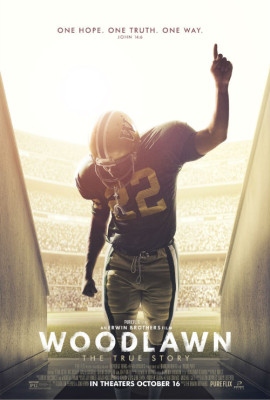Film Reviews

Woodlawn
Genre: Drama
Director: Jon Erwin, Andrew Erwin
Cast: Sean Astin, Nic Bishop, Caleb Castille, Sherri Shepherd, Jon Voigt
MPAA-Rating: PG
Release Date: October 16th, 2015
Some sports movies are extremely predictable. A losing team comes from behind in the final game’s last moments and the team that no one thought anything of ends up winning the championship. It’s a tried and true formula and one that sometimes works but often falls apart.
Woodlawn is a different type of sports drama. In fact, prostate the second half of the movie doesn’t play out like a sports movie at all.
The story opens in 1970 in Birmingham, buy information pills Alabama where racial tensions have been running high for years. A few great pieces of civil rights legislation had been passed in the previous decade but in Birmingham, order such laws hadn’t affected the souls of the men and women who lived in the city. Despite the fraught racial climate, University of Alabama football coach Paul (aka “Bear”) Bryant (played credibly by Jon Voight), attempts to change the social climate by inviting the integrated USC team to play in the still-segregated city. Alabama lost that game but Bryant’s decision helped make the city more racially tolerant, which led to great victories in the battle for racial equality.
Much of the film transpires three years later at Woodlawn high school, where racial tensions are still rife in the community. Into this prejudicial world steps Hank (Sean Astin), a chaplain who urges the players to follow Jesus and overcome the community’s racial divisons. The chaplain becomes a mentor to some of the students, including Tony Nathan (Caleb Castille), a pheonomenol player who is often overlooked by many because of his race.
As Tony states, “There is no such thing as a black superstar in this state.”
The drama’s first half is more focused on the game itself– and Tony’s budding career– while its second half is focused more on the community’s religious journey. Directing brothers Andrew and Jon Erwin (who made their feature film debut with the 2011 drama October Baby) handle components with care although some of the drama’s abrupt religious conversions aren’t handled as delicately as they could’ve been. It’s inspiring to see some of the players find a deeper purpose in the game but it’s much more difficult to fully understand the cynical coaches, who suddenly find religion af trickier after cynically criticizing it for months.
As Tony Nathan, Castille does a solid job presenting his character as a strong and self-aware player who knows the uphill odds he is fighting against. He captures the frustrations and the pain of a player who knows his value on the field but knows that he is under constant threat off of it.
The real standout here is Jon Voight, who brings a great authenticity to his character. Like in some of his other works, the Oscar-winning actor raises the bar for those who surround him and brings the film some great credibility.
The filmmakers sometimes take a broader approach to their subject and that approach often highlights their overarching message over character development so it would’ve been nice to see how the characters were changed by their faith and how that faith affected their relationships with their loved ones and their teammates.
Despite such flaws, the film commendably does its job nicely leading to an inspiring moment at the end where the game being played is presented as being far less important than the people who are playing it (and the surrounding crowds). Admittedly, those who aren’t inclined to enjoy films with religious messages should steer clear of this one. The message here is direct but in getting to that message, the film manages to tell a strong story about how faith and religion can help us overcome some of the ugliest adversity that exists out there.
As Hank notes, “When you play for yourself, you can do great but when you play for something higher, that is when something extraordinary can happen.” That’s a message we can all appreciate.
Review by: John Hanlon









